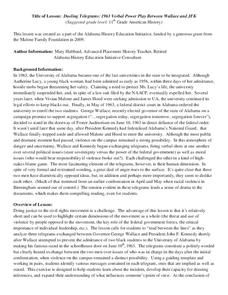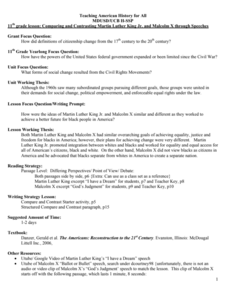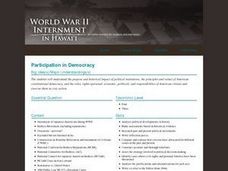Curated OER
Thurgood Marshall Makes a Difference
Students find information about the life and legal career of Thurgood Marshall, including the NAACP and its causes. They comprehend the issues and context of the Brown v. Board of Education case that Marshall argued before the U.S....
Curated OER
Post-WWII De-Colonization
The end of WWII brought big changes around the world, not the least of which occur in the increasingly decolonized continent of Africa. This slideshow details the developing countries of Ghana, Kenya, Congo, Nigeria, and South Africa, to...
Beacon Press
A Time to Break Silence
Encourage teenagers to get involved in ending violence among young people. A Common Core-aligned resource and curriculum guide, designed to be used with a reading of A Time to Break Silence: The Essential Works of Martin Luther King,...
PBS
Universal Declaration of Human Rights
What rights are guaranteed to students? Do they align with the Universal Declaration of Human Rights, which was approved by the United Nations in 1948? Middle and high schoolers present persuasive arguments about the rights they believe...
Alabama Department of Archives and History
Dueling Telegrams: 1963 Verbal Power Play Between Wallace and JFK
Information, inferences, and innuendos. Text and subtext. Class members examine telegrams exchanged between President John F. Kennedy and Alabama Governor George Wallace, studying both what is stated and what is implied by the diction...
Core Knowledge Foundation
Early Presidents and Social Reformers
A unit by Core Knowledge begins with information about early United States presidents. Pupils then explore social reformers such as Sojourner Truth and Frederick Douglas, abolitionism, women's rights, and more. Participants listen and...
Core Knowledge Foundation
Fighting for a Cause Tell It Again!™ Read-Aloud Anthology
A read-aloud anthology highlights the essential contributions of activists Susan B. Anthony, Eleanor Roosevelt, Mary McLeod Bethune, Jackie Robinson, Rosa Parks, Martin Luther King Jr., and Cesar Chavez. Scholars listen to stories,...
University of Arkansas
Our Responsibilities
The fourth in a five-lesson plan unit examining human rights and personal responsibility asks class groups to investigate a current rights issue, and using the provided graphic organizer, summarize the issue, consider which rights are...
Curated OER
Making a Case
Start the day by sharing opinions about human rights. Then, read "A Defiant Hussein Pleads Not Guilty to Mass Execution" with your middle and high school class. Your pupils research the specific charges in the case against Saddam...
Project Tahoe
Individual Rights vs. The Greater Good Within the Scope of War
When, if ever, is the government justified in restricting individual rights? When, if ever, should the "greater good" trump individual rights? To prepare to discuss this hot-button topic, class members examine primary source documents,...
Curated OER
Argument in an Athenian Jail: Socrates and the Law
Students read and discuss Socrates's "Crito" and examine the arguments he made supporting his own death penalty. They consider the still-relevant debate between the rights of the individual and the rule of law.
Curated OER
Unit 1: Building Historical Background Knowledge: The Road to Revolution 1754–1776
What were the conditions that led to the American Revolution? What are the conditions that lead to revolution in other times and places? Class members examine primary source materials and use evidence drawn from these documents to craft...
Rancocas Valley Regional High School
Teaching American History for All
Although Dr. Martin Luther King, Jr. and Malcolm X both work for equal rights, social change, and political empowerment, their approaches were radically different. To better understand these contrasts, class members compare King's "I...
C3 Teachers
Women’s Rights: What Does It Mean to Be Equal?
A guided-inquiry lesson asks seventh graders to research the compelling question, "What does it mean to be equal?" Guided by three supporting questions, researchers complete three formative performance tasks and gather evidence from...
PBS
Who, Me? Biased?: Understanding Implicit Bias
A 10-page interactive explains different facets of implicit bias, demonstrates how implicit bias works, and how people can counteract its effects. The interactive tools permit users to save their information in "My Work" folders, to take...
Core Knowledge Foundation
Volume 2 - A History of the United States: Modern Times—Late 1800s to the 2000s
The second volume of the Core Knowledge History of the United States ebook begins by asking young scholars to consider the impact immigration, industrialization, and urbanization had on the United States in the late 1800s. The text ends...
Curated OER
Everybody Is Unique: A Lesson in Respect for Others' Differences
Learners of all ages talk about the meaning of the word "unique," and draw a truly unique person, one part at a time. They create a totally unique person, with a head drawn by one student, a torso drawn by another student, and lower body...
Curated OER
Unit 2: Post-Revolution: The Critical Period 1781-1878
The post-Revolutionary Period of 1781-1787, also known as the Critical Period, is the focus of a series of lessons that prompt class members to examine primary source documents that reveal the instability of the period of the Articles of...
Curated OER
United States Colored Troops
Students explore the role that African American soldiers had in the Civil War and the impact they had on the US Civil Rights movement after the war. They complete a timeline, read an excerpt and analyze a primary image.
Curated OER
Inventors & Trailblazers
Students are introduced to a groups of African American inventors. In groups, they research the role of each person in improving different industries. They also examine the barriers African Americans faced from the Civil War to the...
Curated OER
Say It Loud!: A Celebration Of Black Music In America
Students examine the role music played in African American history and research events of the Civil Rights movement.
Curated OER
Participating in Democracy
Students analyze film clips in class. In this democracy lesson plan, students identify the differences between civil liberties, democracy and freedom. Students view a video regarding Japanese internment and answer study questions as well...
Curated OER
The Constitution
A study of the Constitution can lead students into an exploration of civil rights, laws, and history.
Curated OER
Just an Environment or a Just Environment?
This instructional activity explores the multiple causes of racial segregation and environmental racism, and helps students understand the perpetuation of institutional racism in the post-Civil Rights era. Students will perform a mock...
Other popular searches
- Civil Rights Movement
- Civil Rights Act
- Civil Rights Harriet Tubman
- Civil Rights Music
- Civil Rights Movement Music
- Civil Rights Act 1964
- Civil Rights Era
- Civil Rights Act of 1964
- Civil Rights Legislation
- Children's Civil Rights
- U.s. Civil Rights
- American Civil Rights Movement

























